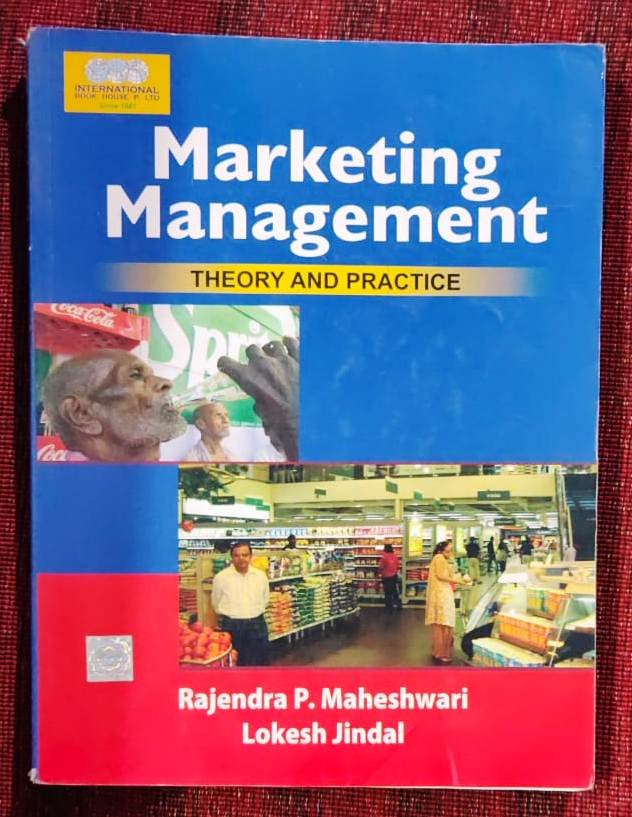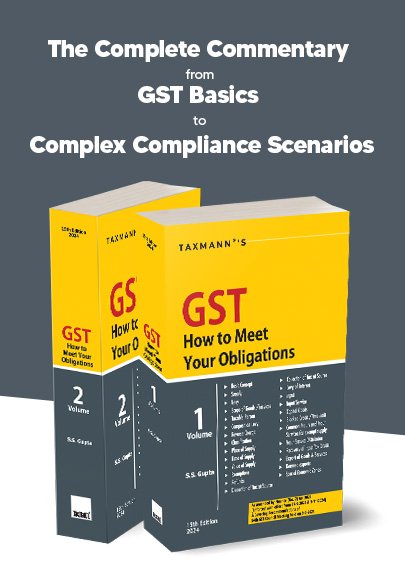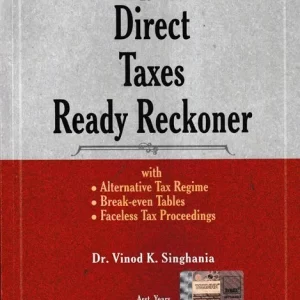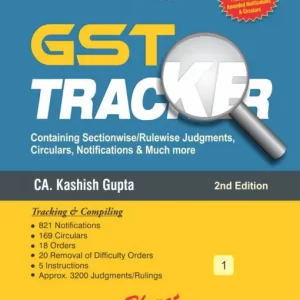GST How to Meet Your Obligations by S.S. Gupta – 15th Edition 2024
Original price was: ₹7,295.00.₹5,470.00Current price is: ₹5,470.00.
GST How to Meet Your Obligations by S.S. Gupta – 15th Edition 2024
Out of stock
Description
Taxmann’s bestselling flagship commentary, GST How to Meet Your Obligations, provides a comprehensive and practical analysis of India’s Goods and Services Tax (GST). This 2-volume set offers detailed insights into GST law, covering every aspect of the statutory provisions, including Acts, Rules, Notifications, and Clarifications. With over 2,500 pages, the book explains the key areas of GST, such as levy, exemptions, input tax credit, exports/imports, and dispute resolution, using clear language, illustrations, and examples to break down complex provisions. Supported by judicial rulings and case laws, it acts as a reliable and trusted guide for understanding the complexities of GST.
This commentary is an essential resource for a wide range of professionals. Tax professionals and consultants will find it a comprehensive guide for advisory and compliance purposes. Business owners and financial managers can use it to effectively adhere to GST obligations, ensuring smooth operations and compliance. Departmental officers benefit from its authoritative content, serving as a valuable reference for administration and enforcement. Legal practitioners and courts will find clarity on GST provisions and case law interpretations, making it a trusted tool for handling litigation and legal analysis related to GST.
The Present Publication is the 15th Edition, amended by the Finance (No. 2) Act, 2024, enforced w.e.f. 27th September & 1st November, 2024. It covers the recommendations of the 54th GST Council Meeting and is authored by S.S. Gupta, with the following noteworthy features:
- [Exhaustive GST Commentary] The book provides an in-depth commentary on various provisions of GST spread across eighty-nine chapters. It covers key areas of GST law, including levy, exemptions, input tax credit, exports and imports, special scenarios, compliance, and dispute resolution
- [Interlinking of Statutory Contents] This commentary provides an interlinked approach to GST laws, rules, and notifications. It explains the scope of provisions across sections, rules, and statutes, offering a comprehensive understanding of how the GST law operates in an interconnected manner
- [Judicial Precedents & Case Laws] Each topic is supported by relevant case laws and judgements from various Tribunals, High Courts, and the Supreme Court. This aids in understanding the practical interpretation of provisions and assists professionals in applying the law accurately in complex scenarios
- [Illustrations & Practical Examples] Numerous examples and illustrations are provided throughout the book, simplifying complex concepts and demonstrating the real-world application of GST provisions
- [Simple & Lucid Language] The book is designed to be user-friendly, making even the most complex legal provisions easily comprehensible. It is tailored to explain the law in layman’s terms, ensuring that readers from varied backgrounds can understand the GST framework effectively
The topics across the two volumes are arranged systematically, beginning with the basic principles of GST and advancing to detailed discussions on special scenarios, transitional provisions, and dispute resolution. The book is structured across multiple divisions, ensuring a logical and thorough progression of concepts
- Division One | Basic Concepts
- Chapter 1 – Introduction & Basic Concept
- Introduces the fundamentals of GST, including its background, need, and the legal framework
- Chapter 2 – Constitutional Amendment
- Discusses the constitutional provisions underpinning GST
- Chapter 3 – Framework of GST Laws
- Explores the structure and framework of GST laws in India
- Chapter 1 – Introduction & Basic Concept
- Division Two | Levy of GST – Key Aspects
- Chapter 4 – Meaning and Scope of Supply
- Explains the supply concept, its scope, and relevance under GST.
- Chapter 5 – Deemed Supplies
- Details transactions deemed as supplies under GST law
- Chapter 6 – Levy of GST
- Discusses the charging section of GST
- Chapter 7 – Meaning of Goods
- Defines ‘goods’ and their treatment under GST
- Chapter 8 – Meaning & Scope of Service
- Explains the scope and definition of services
- Chapters 9-19
- Cover topics such as inter-state and intra-state supplies, taxable persons, composition levy, reverse charge mechanism, classification and rates of tax, place and time of supply, value of supply, exemptions, and non-taxable supplies
- Chapter 20 – Refund of Taxes
- Explores situations where refunds are applicable, including exports and excess tax payments
- Chapter 21 – Deduction of Tax at Source
- Discusses the concept of TDS under GST, applicable provisions, and practical compliance
- Chapter 22 – Collection of Tax at Source
- Provides guidance on TCS obligations for e-commerce operators and other specified persons
- Chapter 23 – Levy of Interest
- Covers provisions related to interest on delayed tax payments and refunds
- Chapter 24 – Other Levies – GST (Compensation to States) Act & Cess
- Explains the additional levies and cess imposed for compensating states for revenue loss
- Chapter 4 – Meaning and Scope of Supply
- Division Three | Input Tax Credit
- Chapter 25 – Introduction to Input Tax Credit
- Provides an overview of the input tax credit mechanism
- Chapters 26-36
- Cover eligibility criteria, blocked credits, conditions for availing ITC, ITC utilisation, and the treatment of input services, capital goods, and common inputs for exempted and taxable supplies. It also includes guidance on input service distributors, matching of credit, blacklisting of dealers, and recovery provisions
- Chapter 25 – Introduction to Input Tax Credit
- Division Four | Export and Import of Goods and Services
- Chapter 37 – Export of Goods
- Explains the taxation and procedural aspects related to the export of goods
- Chapters 38-46
- Discuss the taxation of export services, import procedures, deemed exports, supplies to SEZs, warehouse transactions, high sea sales, and operations under the MOOWR scheme
- Chapter 37 – Export of Goods
- Division Five | Special Scenarios
- Chapter 47 – Transaction with Related Party/Distinct Person
- Analyses GST implications for related party transactions
- Chapters 48-58A
- Cover specific situations like job work, e-commerce supplies, online services, corporate guarantees, mergers, taxation of vouchers, discounts, actionable claims, and the waiver of interest or penalty
- Chapter 47 – Transaction with Related Party/Distinct Person
- Division Six | Transitional Provisions
- Chapter 59 – Transitional Credits
- Details how credits can be carried forward from the pre-GST regime
- Chapters 60-63
- Discuss transitional provisions, the impact on ongoing contracts, anti-profiteering measures, and the repeal of erstwhile laws
- Chapter 59 – Transitional Credits
- Division Seven | GST Compliance
- Chapter 64 – Registration
- Covers registration requirements, procedures, and types of GST registration
- Chapters 65-71
- Provide practical guidance on documentation, e-way bills, input tax credit records, tax payments, returns and reconciliations, and special compliance for selected products.
- Chapter 64 – Registration
- Division Eight | Administration, Assessments, Audits & Investigation
- Chapter 72 – Class and Power of Officers
- Discusses the authority and jurisdiction of GST officers
- Chapters 73-77
- Include detailed procedures on assessments, return scrutiny, audits (regular and special), demand, recovery, and adjudication
- Chapter 78 – Inspection, Search & Seizure
- Explores the powers of officers to inspect, search, and seize goods or records to ensure compliance
- Chapter 79 – Provisional Attachment
- Discusses provisions on attaching properties of taxpayers for safeguarding government revenue
- Chapter 80 – Residual Matters
- Covers various residual matters not addressed in earlier chapters, providing a holistic understanding of administrative and procedural aspects under GST
- Chapter 72 – Class and Power of Officers
- Division Nine | Penalties and Prosecution
- Chapter 81 – Penalties, Confiscation & Fines
- Explores the legal consequences for non-compliance with GST provisions
- Chapter 82 – Arrest, Prosecution, and Confiscation
- Details prosecution procedures and offences under GST law
- Chapter 81 – Penalties, Confiscation & Fines
- Division Ten | Dispute Resolution
- Chapter 83 – Appeals | General Provisions
- Outlines the appeal process, time limits, pre-deposit requirements, and powers of revisionary authorities
- Chapters 84-89
- Include procedures for appeals to appellate authorities, GST Appellate Tribunals, High Courts, and the Supreme Court, along with guidelines on advance rulings and the GST Amnesty Scheme
- Chapter 83 – Appeals | General Provisions
- Appendices
- A compilation of key legislative texts, including
- Central Goods and Services Tax Act, 2017
- Integrated Goods and Services Tax Act, 2017
- Union Territory Goods and Services Tax Act, 2017
- GST Compensation to States Act, 2017
- CGST Rules, 2017
- IGST Rules, 2017
- A compilation of key legislative texts, including
Additional information
| BINDING | PAPERBACK |
|---|---|
| AUTHOR | S.S. Gupta |
| EDITION | 2024 |
| ISBN | 9789364552622 |
| PUBLICATION | TAXMANN PUBLICATIONS |








Reviews
There are no reviews yet.